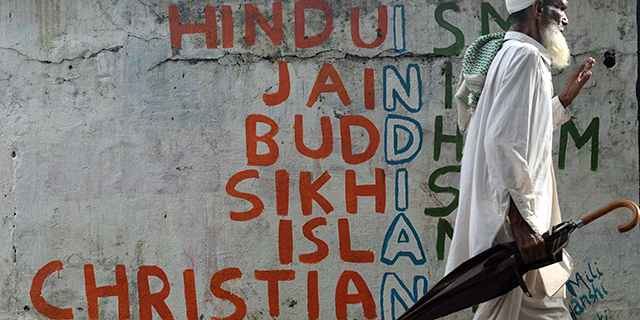
What’s a sin? Catholics don’t always agree with their church
Almost nine-in-ten U.S. Catholics believe that some actions are offensive to God, but many American Catholics don't agree with church teachings on what constitutes sinful behavior.
Almost nine-in-ten U.S. Catholics believe that some actions are offensive to God, but many American Catholics don't agree with church teachings on what constitutes sinful behavior.
Pope Francis will celebrate Mass on an enormous scale Sunday, with 2 million people expected to gather on a mile-long parkway in downtown Philadelphia. We gathered key facts about Communion and U.S. Catholics for the occasion.
A majority of all Hispanic adults identify as Catholic and a large majority of Hispanic Catholics speak Spanish fluently. Eight-in-ten Hispanic Catholics use mostly Spanish or are bilingual. In fact, they are more likely to be Spanish speakers than non-Catholic Hispanics (68%).
On a variety of issues – such as recognizing gay marriages and determining eligibility for Holy Communion – Latino Catholics tend to be more aligned with the church than are white Catholics.
On his first papal trip to the U. S., Pope Francis will visit three Northeastern cities that are within a few hundred miles of each other. But while New York City, Philadelphia and Washington, D.C., may be geographically close, their Catholic populations look different from one another in several ways.
Some older American Catholics might remember a time when people thought of the Catholic Church like a family: hard to ignore and even harder to leave. But a new Pew Research Center survey of U.S. Catholics shows that at least some of these perceptions may no longer be entirely true.
The face of Catholic America is changing. Today, immigrants make up a considerable share of Catholics, and many are Hispanic. At the same time, there has been a regional shift, from the Northeast (long home to a large percentage of the Catholic faithful) and Midwest to the Western and Southern parts of the U.S.
Pope Francis has announced major changes to the Roman Catholic Church’s procedures for marriage annulments. While the new changes are aimed at making annulments faster and less expensive, a recent Pew Research survey found that most divorced U.S. Catholics who did not seek annulments did not cite the complicated nature of the process as a reason.
The share of Americans whose primary religious affiliation is Catholic has fallen somewhat in recent years, and now stands at about one-in-five. But an additional one-in-ten American adults (9%) consider themselves Catholic or partially Catholic in other ways, even though they do not self-identify as Catholic on the basis of religion.
The new Pew Research Center survey of U.S. Catholics provides an opportunity to take stock of Americans’ Catholic identity – not just people who identify primarily as Catholics, but the entire spectrum of those whose lives have crossed paths with the Catholic Church in a meaningful way.
The Global Religious Futures (GRF) project is jointly funded by The Pew Charitable Trusts and The John Templeton Foundation. Here are some big-picture findings from the GRF, together with context from other Pew Research Center studies.
Indians see religious tolerance as a central part of who they are as a nation. Across the major religious groups, most people say it is very important to respect all religions to be “truly Indian.”
Today, most Black adults say they rely on prayer to help make major decisions, and view opposing racism as essential to their religious faith.
The Christian share of the U.S. population is declining, while the share of Americans who do not identify with any organized religion is growing. These changes affect all regions in the country and many demographic groups.












